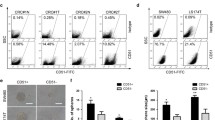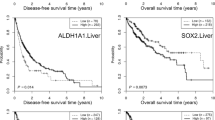Abstract
Background
Colorectal cancer (CRC) ranks second in cancer deaths worldwide and presents multiple management challenges, one of which is identifying high risk stage II disease that may benefit from adjuvant therapy. Molecular biomarkers, such as ones that identify stem cell activity, could better stratify high-risk cohorts for additional treatment.
Methods
To identify possible biomarkers of high-risk disease in early-stage CRC, a discovery set (n = 66) of advanced-stage tumors were immunostained with antibodies to stemness proteins (CD166, CD44, CD26, and LGR5) and then digitally analyzed. Using a second validation cohort (n = 54) of primary CRC tumors, we analyzed protein and gene expression of CD166 across disease stages, and extended our analyses to CD166-associated genes (LGR5, ASCL2, BMI1, POSTN, and VIM) by qRT-PCR.
Results
Stage III and metastatic CRC tumors highly expressed stem cell-associated proteins, CD166, CD44, and LGR5. When evaluated across stages, CD166 protein expression was elevated in advanced-stage compared to early-stage tumors. Notably, a small subset of stage I and II cancers harbored elevated CD166 protein expression, which correlated with development of recurrent cancer or adenomatous polyps. Gene expression analyses of CD166-associated molecules revealed elevated ASCL2 in primary tumors from patients who recurred.
Conclusions
We identified a protein signature prognostic of aggressive disease in early stage CRC. Stem cell-associated protein and gene expression identified a subset of early-stage tumors associated with cancer recurrence and/or subsequent adenoma formation. Signatures for stemness offer promising fingerprints for stratifying early-stage patients at high risk of recurrence.


Similar content being viewed by others
References
Siegel RL, Miller KD, Jemal A (2018) Cancer statistics, 2018. CA: a cancer. J Clin 68:7–30
Vatandoust S, Price TJ, Karapetis CS (2015) Colorectal cancer: Metastases to a single organ. World J Gastroenterol 21:11767–11776
Benson AB 3rd, Schrag D, Somerfield MR et al (2004) american society of clinical oncology recommendations on adjuvant chemotherapy for stage II colon cancer. J Clin Oncol : Off J Am Soc Clin Oncol 22:3408–3419
Dotan E, Cohen SJ (2011) Challenges in the management of stage II colon cancer. Semin Oncol 38:511–520
Gray R, Barnwell J, McConkey C et al (2007) Adjuvant chemotherapy versus observation in patients with colorectal cancer: a randomised study. Lancet 370:2020–2029
Varghese A (2015) Chemotherapy for Stage II Colon Cancer. Clin Colon Rectal Surg 28:256–261
Manfredi S, Bouvier AM, Lepage C et al (2006) Incidence and patterns of recurrence after resection for cure of colonic cancer in a well defined population. Br J Surg 93:1115–1122
Bockelman C, Engelmann BE, Kaprio T et al (2015) Risk of recurrence in patients with colon cancer stage II and III: a systematic review and meta-analysis of recent literature. Acta Oncol (Stockholm, Sweden) 54:5–16
Snyder RA, Hu CY, Cuddy A et al (2018) Association between intensity of posttreatment surveillance testing and detection of recurrence in patients with colorectal cancer. JAMA 319:2104–2115
Kannarkatt J, Joseph J, Kurniali PC et al (2017) Adjuvant chemotherapy for stage ii colon cancer: a clinical dilemma. J Oncol Pract 13:233–241
Benson AB 3rd, Venook AP, Al-Hawary MM et al (2018) NCCN guidelines insights: colon cancer, version 2.2018. J Natl Compr Cancer Netw: JNCCN 16:359–369
Schrag D, Rifas-Shiman S, Saltz L et al (2002) Adjuvant chemotherapy use for Medicare beneficiaries with stage II colon cancer. J Clin Oncol : Off J Am Soc Clin Oncol 20:3999–4005
Tournigand C, de Gramont A (2011) Chemotherapy: is adjuvant chemotherapy an option for stage II colon cancer? Nat Rev Clin Oncol 8:574
Kneuertz PJ, Chang GJ, Hu CY et al (2015) Overtreatment of young adults with colon cancer: more intense treatments with unmatched survival gains. JAMA Surg 150:402–409
Kusters M, Marijnen CA, van de Velde CJ et al (2010) Patterns of local recurrence in rectal cancer; a study of the Dutch TME trial. Eur J Surg Oncol: J Eur Soc Surg Oncol Br Assoc Surg Oncol 36:470–476
Gopalan S, Bose JC, Periasamy S (2015) Anastomotic recurrence of colon cancer-is it a local recurrence, a second primary, or a metastatic disease (local manifestation of systemic disease)? Indian J Surg 77:232–236
Dalerba P, Cho RW, Clarke MF (2007) Cancer stem cells: models and concepts. Annu Rev Med 58:267–284
Boman BM, Huang E (2008) Human colon cancer stem cells: a new paradigm in gastrointestinal oncology. J Clin Oncol 26:2828–2838
Baccelli I, Trumpp A (2012) The evolving concept of cancer and metastasis stem cells. J Cell Biol 198:281–293
Guan Y, Gerhard B, Hogge DE (2003) Detection, isolation, and stimulation of quiescent primitive leukemic progenitor cells from patients with acute myeloid leukemia (AML). Blood 101:3142–3149
Morrison SJ, Weissman IL (1994) The long-term repopulating subset of hematopoietic stem cells is deterministic and isolatable by phenotype. Immunity 1:661–673
Chen W, Dong J, Haiech J et al (2016) Cancer stem cell quiescence and plasticity as major challenges in cancer therapy. Stem cells Int 2016:1740936
Vermeulen L, De Sousa EMF, van der Heijden M et al (2010) Wnt activity defines colon cancer stem cells and is regulated by the microenvironment. Nat Cell Biol 12:468–476
Moon RT, Kohn AD, De Ferrari GV et al (2004) WNT and beta-catenin signalling: diseases and therapies. Nat Rev Genet 5:691–701
Prieve MG, Moon RT (2003) Stromelysin-1 and mesothelin are differentially regulated by Wnt-5a and Wnt-1 in C57mg mouse mammary epithelial cells. BMC Dev Biol 3:2
Smith NR, Davies PS, Levin TG et al (2017) Cell adhesion molecule cd166/alcam functions within the crypt to orchestrate murine intestinal stem cell homeostasis. Cell Mol Gastroenterol Hepatol 3:389–409
Plaks V, Kong N, Werb Z (2015) The cancer stem cell niche: how essential is the niche in regulating stemness of tumor cells? Cell Stem Cell 16:225–238
Massari ME, Murre C (2000) Helix-loop-helix proteins: regulators of transcription in eucaryotic organisms. Mol Cell Biol 20:429–440
Schuijers J, Junker JP, Mokry M et al (2015) Ascl2 acts as an R-spondin/Wnt-responsive switch to control stemness in intestinal crypts. Cell Stem Cell 16:158–170
Zhang F, Luo K, Rong Z et al (2017) Periostin upregulates wnt/beta-catenin signaling to promote the osteogenesis of CTLA4-modified human bone marrow-mesenchymal stem cells. Sci Rep 7:41634
Satelli A, Hu J, Xia X et al (2016) Potential function of exogenous vimentin on the activation of wnt signaling pathway in cancer cells. J Cancer 7:1824–1832
Ye J, Liu S, Shang Y et al (2018) R-spondin1/Wnt-enhanced Ascl2 autoregulation controls the self-renewal of colorectal cancer progenitor cells. Cell Cycle (Georgetown, Tex) 17:1014–1025
Lamprecht M, Sabatini D, Carpenter A (2007) Cell Profiler™: free, versatile software for automated biological image analysis. Biotechniques 42:71–75
Hessman CJ, Bubbers EJ, Billingsley KG et al (2012) Loss of expression of the cancer stem cell marker aldehyde dehydrogenase 1 correlates with advanced-stage colorectal cancer. Am J Surg 203:649–653
Levin TG, Powell AE, Davies PS et al (2010) characterization of the intestinal cancer stem cell marker CD166 in the human and mouse gastrointestinal tract. Gastroenterology 139:2072–2082.e2075
Smith NR, Swain JR, Davies PS et al (2018) monoclonal antibodies reveal dynamic plasticity between Lgr5- and Bmi1-expressing intestinal cell populations. Cell Mol Gastroenterol Hepatol 6:79–96
Tournigand C, Andre T, Bonnetain F et al (2012) Adjuvant therapy with fluorouracil and oxaliplatin in stage II and elderly patients (between ages 70 and 75 years) with colon cancer: subgroup analyses of the multicenter international study of oxaliplatin, fluorouracil, and leucovorin in the adjuvant treatment of colon cancer trial. J Clin Oncol: Off J Am Soc Clin Oncol 30:3353–3360
Werling RW, Yaziji H, Bacchi CE et al (2003) CDX2, a highly sensitive and specific marker of adenocarcinomas of intestinal origin: an immunohistochemical survey of 476 primary and metastatic carcinomas. Am J Surg Pathol 27:303–310
Dalerba P, Sahoo D, Paik S et al (2016) CDX2 as a Prognostic Biomarker In stage II and stage III colon Cancer. N Engl J Med 374:211–222
Bae JM, Lee TH, Cho NY et al (2015) Loss of CDX2 expression is associated with poor prognosis in colorectal cancer patients. World J Gastroenterol 21:1457–1467
Malanchi I, Santamaria-Martinez A, Susanto E et al (2011) Interactions between cancer stem cells and their niche govern metastatic colonization. Nature 481:85–89
Basu S, Haase G, Ben-Ze'ev A (2016) Wnt signaling in cancer stem cells and colon cancer metastasis [version 1; peer review: 3 approved]. F1000Research. https://doi.org/10.12688/f1000research.7579.1
Jing F, Kim HJ, Kim CH et al (2015) Colon cancer stem cell markers CD44 and CD133 in patients with colorectal cancer and synchronous hepatic metastases. Int J Oncol 46:1582–1588
Kobayashi Y, Kadoya T, Amioka A et al (2018) Wnt5a-induced cell migration is associated with the aggressiveness of estrogen receptor-positive breast cancer. Oncotarget 9:20979–20992
Hanahan D, Coussens LM (2012) Accessories to the crime: functions of cells recruited to the tumor microenvironment. Cancer Cell 21:309–322
Weichert W (2004) ALCAM/CD166 is overexpressed in colorectal carcinoma and correlates with shortened patient survival. J Clin Pathol 57:1160–1164
Clevers H, Loh KM, Nusse R (2014) Stem cell signalling. An integral program for tissue renewal and regeneration: wnt signaling and stem cell control. Science 346:1248012
Vakiani E, Shah RH, Berger MF et al (2017) Local recurrences at the anastomotic area are clonally related to the primary tumor in sporadic colorectal carcinoma. Oncotarget 8:42487–42494
Rosa I, Fidalgo P, Chaves P et al (2015) The co-localization of carcinomas and adenomas favors a regional field defect in the colon: an observational study. Int J Colorectal Dis 30:323–327
Liska D, Stocchi L, Karagkounis G et al (2017) Incidence, patterns, and predictors of locoregional recurrence in colon cancer. Ann Surg Oncol 24:1093–1099
Frambach P, Pucciarelli S, Perin A et al (2018) Metastatic pattern and new primary tumours after neoadjuvant therapy and surgery in rectal cancer. Colorectal Dis : Off J Assoc Coloproctology G B Irel 20:O326–o334
Kim SH, Park KH, Shin SJ et al (2018) CpG Island Methylator Phenotype and Methylation of Wnt Pathway Genes Together Predict Survival in Patients with Colorectal Cancer. Yonsei Med J 59:588–594
Kandimalla R, Linnekamp JF, van Hooff S et al (2017) Methylation of WNT target genes AXIN2 and DKK1 as robust biomarkers for recurrence prediction in stage II colon cancer. Oncogenesis 6:e308
Li C, Cai S, Wang X et al (2014) Hypomethylation-associated up-regulation of TCF3 expression and recurrence in stage II and III colorectal cancer. PLoS ONE 9:e112005
Lee MA, Park JH, Rhyu SY et al (2014) Wnt3a expression is associated with MMP-9 expression in primary tumor and metastatic site in recurrent or stage IV colorectal cancer. BMC Cancer 14:125
Leedham SJ, Chetty R (2016) Wnt disruption in colorectal polyps - the traditional serrated adenoma enters the fray. J Pathol 239:387–390
Jubb AM, Chalasani S, Frantz GD et al (2006) Achaete-scute like 2 (ascl2) is a target of Wnt signalling and is upregulated in intestinal neoplasia. Oncogene 25:3445–3457
Kwon OH, Park JL, Baek SJ et al (2013) Aberrant upregulation of ASCL2 by promoter demethylation promotes the growth and resistance to 5-fluorouracil of gastric cancer cells. Cancer Sci 104:391–397
Acknowledgements
Research reported in this publication was supported by the National Institute of Digestive Disease U01DK085525 (MHW); Knight Cancer Institute Pilot award (VLT); and the Knight Cancer Institute P30CA069533.
Author information
Authors and Affiliations
Corresponding authors
Ethics declarations
Conflict of interest
The authors declare that they have no conflict of interest.
Informed consent
Informed consent was obtained from all individual participants included in the study. Study was approved by the Institutional Review Board from both institutions (OHSU and Kaiser Permanente) prior to conducting any review of archived tissue or patient data.
Additional information
Publisher's Note
Springer Nature remains neutral with regard to jurisdictional claims in published maps and institutional affiliations.
Electronic supplementary material
Below is the link to the electronic supplementary material.
Rights and permissions
About this article
Cite this article
Walker, B.S., Zarour, L.R., Wieghard, N. et al. Stem Cell Marker Expression in Early Stage Colorectal Cancer is Associated with Recurrent Intestinal Neoplasia. World J Surg 44, 3501–3509 (2020). https://doi.org/10.1007/s00268-020-05586-z
Published:
Issue Date:
DOI: https://doi.org/10.1007/s00268-020-05586-z




